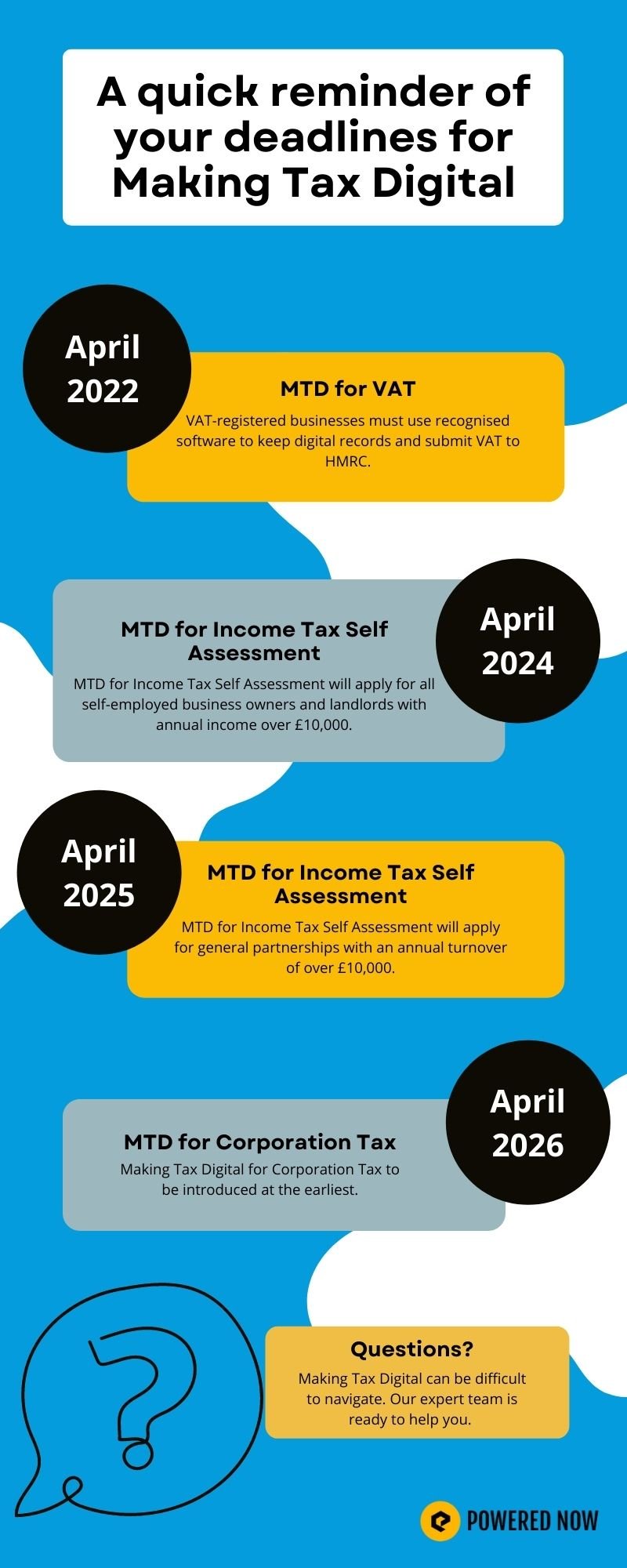One of the decisions that smaller business owners with sales of less than £85k per annum could make is to voluntarily register for VAT. Ben Dyer of Powered Now looks at why this is a decision that makes sense in some circumstances.
It would be fair to ask if suggesting that you might like to voluntarily register for VAT is a sign of madness.
That is a good question. It’s worth asking as registering for VAT will lead to more administration as well as the need to charge customers for VAT. In addition, from April 2022 onwards, there’s a need to comply with HMRC’s Making Tax Digital if you are voluntarily registered. Being a tax collector on behalf of HMRC does not normally appeal to anyone.
However, it’s not as simple as that and there are certain circumstances where voluntary registration does make business sense.
>> Have you tried Powered Now? Tax doesn’t have to be complicated. With Powered Now, you can simply set it up and forget about it.
{{cta(‘cf120b01-1f58-4c72-80e0-05d91bba7c4e’,’justifycenter’)}}
The advantages of being VAT registered
The big advantage – customers can claim back any VAT that they pay
There can be a benefit to any business that is mostly selling to other businesses that are VAT registered. That’s because the customer can claim back any VAT that they pay, including on any supply of materials. You w
ould think that they are neutral when it comes to whether the contractor is VAT registered, but that isn’t the case.
Taking an example of a business selling to a VAT registered business, here is how it works.
The business doing the selling might pay £2,000 for materials + VAT = £2,400, which cost will be passed on. They then charge £4,000 labour with VAT added only if they are VAT registered.
So, when the business selling is NOT VAT registered:
- They charge £2,400 + £4,000 = £6,400 which is what is paid
- They pay £2,400 to the supplier
- So, they receive £4,000 net
- The customer cannot claim back any VAT so they are £6,400 out of pocket
However, when they are VAT registered selling to a VAT registered business:
- They charge £2,400 + £4,000 + £800 VAT = £7,200 which is what is paid
- They pay HMRC £1,200 VAT received – £400 VAT paid = £800
- They pay £2,400 to the supplier
- So, they receive £4,000 net
- The customer can claim all their VAT back of £1,200 so they are only £6,000 out of pocket.
The customer ends up paying less net when the seller is VAT registered. That’s good for the seller and the customer.
Note that this example ignores the impact of the Domestic Reverse Charge (DRC) which won’t change the overall impact of VAT registration.
However, it’s worth noting that under Making Tax Digital, every business registered for VAT must keep computer-based records of sales and costs and submit VAT returns to HMRC electronically.
>> Read more: What is MTD for VAT?
One other advantage – you can claim VAT back on the costs of setting up a new business
When a business is just starting up and knows that they are going to quickly exceed the VAT threshold or they will mostly service VAT registered businesses then it’s worth registering straight away. This is because they can claim VAT back on the costs of setting up the business. HMRC will actually pay out on the VAT return if it shows that they should! This will help with cashflow and profitability during the start-up phase.
The disadvantages of being VAT registered
Without going into the full details, when a business is selling to residential customers, who won’t be VAT registered, the business must charge VAT but the customer can’t claim this back. This means that the seller is at a competitive disadvantage to a business that isn’t VAT registered.
It’s more complex when a business sells to a mixture of both VAT-registered and residential customers. Depending on the sales mix and direction that the business is trying to head in, it may or may not be better to be VAT registered.
Avoiding compulsion
We’ve looked here at voluntary VAT registration but VAT registration becomes compulsory once sales in any 12 month trailing period exceed £85,000. To avoid this happening for as long as possible a business needs to keep their trailing sales below £85,000. There are a number of legal ways that this can be done:
- Get customers to pay any subcontractors directly. This also avoids CIS.
- Get customers to pay directly for the materials that will be used on their job.
- Use disbursements, the Powered Now app (from my company, you can book a free demo today!) helps with this but very precise rules must be followed to make it work. This is where the contractor is “buying on behalf” of their customer which means the costs don’t have to go through the books.
- Postpone work when approaching the VAT threshold to always keep just under it.

In conclusion
There is very little that is straight-forward when running a trade business. A simple question like “should I voluntarily register for VAT?” turns out to have a complicated answer.
Indeed, VAT is actually more complex for the trade than almost any other sector. There are multiple VAT rates with different rules about when each applies. This includes whether work is for a new build or renovation, whether the project is green and what proportion of the project falls into these different buckets. As well as that, there’s the recently introduced Domestic Reverse Charge (DRC), not to mention the Construction Industry Scheme (CIS) which, while not strictly about VAT, is complex and all about tax.
Really, it’s best to talk to a qualified accountant. At least do this if you are initially setting up for VAT. VAT mistakes can be very expensive to correct, so starting off on the right foot is well worth the fee.
About the author
Benjamin Dyer is CEO and co-founder of Powered Now. Powered Now’s mobile app aims to take the pain out of paperwork for plumbers, electricians, builders and other trade businesses.






